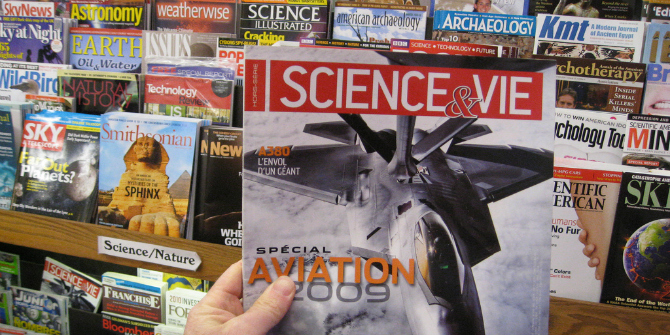Managing Editor Sierra Williams presents a round-up of popular stories from around the web on higher education, academic impact, and trends in scholarly communication.
 Give the pioneers a chance РOA and closing the reputational gap for young scientists by Alexander Grossman:
Give the pioneers a chance – OA and closing the reputational gap for young scientists by Alexander Grossman:
Substitute pay-walled journals with new open science technologies to publicly publish your scientific results; continue to use social network tools to communicate about and discuss recent research with others; and adopt alternative metrics to measure scientific relevance in addition to classical citation. It will be your generation in a decade from now that will craft the careers of other young researchers…The more people like you who follow that path of modern scholarly publishing, the less emphasis will be put on classical incentives for academic evaluation.
An editorial in AIMS Neuroscience has taken to task publication bias and how the scientific community could look to enact more transparency in publishing via Registered Reports. The editorial is titled Instead of “playing the game” it is time to change the rules: Registered Reports at AIMS Neuroscience and beyond [pdf] by Christopher D. Chambers, Eva Feredoes, Suresh D. Muthukumaraswamy, and Peter J. Etchells:
Over the coming years we look forward to seeing Registered Reports expand across more journals and scientific fields, challenging traditional hegemonies and altering incentive structures. In parallel with this initiative, pre-registration of basic science is growing in prominence at the Open Science Framework (https://osf.io/), and the 2013 revision of the Declaration of Helsinki (DoH) now requires some form of study pre-registration for all research involving humans. Although this requirement technically applies only to clinical research, many of the major journals that publish basic neuroscience also request or require adherence to the DoH, such as the Journal of Neuroscience and Cerebral Cortex. The feedback we have received from the academic community has been invaluable in helping us shape this initiative. In return we hope this editorial responds usefully to some of the most frequent questions and concerns. The Registered Reports model complements these advances by incentivising rigour and reproducibility.
creativity and academic writing – an oxymoron? by Pat Thomson:
Blogging can help rattle academic writing. The regularity of writing combines with the blogging conventions of looser argument and more engaging prose. Many bloggers take the opportunity to offer tentative ideas, work in progress, and produce writing that wouldn’t ordinarily make it into the ‘foreshortened’ processes of academic writing that Clifford sees as problematic. The blog can become something more like the waking and dreaming through a topic that he imagines.
The challenge for bloggers I think is how to bring their textual experimentation more strongly into mainstream academic writing – or perhaps a less demanding expectation is how bloggers can work alongside other challengers/challenges to academic writing conventions.
 Image credit: Twentyfour Students (CC BY-SA)
Image credit: Twentyfour Students (CC BY-SA)
On Serendipity in Research in Port Towns and Urban Cultures by Isaac Land:
The paradox of serendipity in research is that it mocks our pretensions to method. We can’t very well control when these handy citations, or helpful colleagues, come our way…Researchers need structure, but they also must never lose their capacity to be surprised by what they find, or to allow serendipity to make its happy interventions.
Immortalising my old research data by Jo Young
I’m no longer doing research and hate to think of all of my data sitting on a dusty shelf in the lab and gradually being sucked into the black hole of research obscurity. Therefore I am now in the process of uploading the majority of my PhD and postdoctoral work to Figshare along with descriptions of the data.







